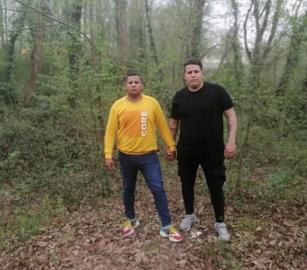Iranwire – Alinaqi Rahmati and his brother Meysam, once spirited protesters in the city of Qazvin, found themselves ensnared in a web of brutality and injustice when they were arrested in last December.

Their story, one that goes to the depths of human suffering, is emblematic of the hardships faced by countless individuals under the Islamic Republic. Despite the authorities issuing an order for their “amnesty” and release, contingent upon commitments from their families, the promise of freedom only led them down a path of devastation and ruin.
The arrests themselves were marked by a callousness that will forever mark the life of Alinaqi, the younger of the two brothers, lovingly referred to as Abbas by those close to him.
Security forces, without a shred of compassion, opened fire on Abbas during the protests and left him wounded in the leg. And then their cruelty continued. They slammed his injured foot into a closing car door and inflicted unimaginable pain – causing him to lose consciousness. Abbas was then taken to a hospital where the authorities considered amputating the leg rather than trying to repair the damage.
He was then jailed, still with an open wound, and left to endure the pain.
Meanwhile, in the Qazvin army detention center, Meysam, the elder brother, endured an equally distressing ordeal. He was tortured and forced to make false confessions against himself and his brother under the duress of relentless interrogators.
Compelled to yield to their demands, Meysam bore the weight of a fabricated guilt, knowing the truth lay far from the distorted narrative woven by his tormentors.
The family of the two brothers continues to face the aftermath of these tragic events, while Abbas, the youngest in the family, whose leg was indeed amputated 25 days after his arrest, now faces a future irrevocably altered by the loss of his leg.
Abbas’s once-vibrant spirit now contends with the challenges of adapting to life as an amputee. A recently married man, he must confront the daunting reality of navigating daily existence in a society that has inflicted such injustice on him.
Qazvin, December 5, 2022
Protesters flooded the streets, their voices resounding with chants of “Death to the baby-killing government,” as captured in the background of videos sent to IranWire from the night of the demonstrations.
But within the chaos and chants, a key aspect of what happened that night in Qazvin went undocumented, with no cameras capturing its images or narrator recounting its events.
The key moments emerged as the atmosphere grew tense and the crowd of protesters faced a brutal assault from the riot squad. Amid the beatings and aggression, several women became targets, marked for forcible abduction. Abbas and Meysam who rose to the occasion and displayed courage by coming to the rescue of these women.
The brothers then sought an escape route, manoeuvring through the crowd, diligently searching for a safe passage.
Suddenly, they encountered a young boy struggling with an asthma attack and desperately seeking Abbas’s aid. “May God take you and me together,” the boy said to them. “If they catch me, I will die.”
Abbas and Meysam decided to assist the young boy and included him in their escape. But as they progressed through the tumultuous streets, the young boy struggled and collapsed, citing breathing difficulties.
Doubts plagued Abbas’s mind, suspecting the boy might be an informant, potentially jeopardizing their location to the forces. And then a Peugeot 405 appeared and obstructed their path. Meysam, slightly ahead and beyond the oppressors’ reach, successfully eluded their grasp.
Abbas found himself trapped, unable to evade capture. One of the agents in the car pulled a gun and shot him in the leg at close range. The bullet shot through his leg – entering from one side and exiting from the other.
Meysam meanwhile retraced his steps and surrendered to the security forces, hoping to ensure Abbas’s safety.
Agents bundled Meysam into the car, while Abbas, injured and bleeding from his leg, remained partially outside. Oblivious to Abbas’s exposed feet, the officer callously slammed the car door repeatedly, inflicting intense blows that caused Abbas to lose consciousness.
Inside the vehicle, the young boy, revealed as the informant, restrained Meysam from behind, while officers ruthlessly struck him on the head with a club.
In the midst of a heavy downpour that fateful night, the officers deposited the unconscious Abbas on the street in front of Qazvin’s Shahid Rajaei hospital, while Meysam was transported to the detention center of the Islamic Revolutionary Guard Corps (IRGC).
Meysam’s Imprisonment
On that fateful night, Meysam, 32 years old and married with three children, was taken to the IRGC detention center, where he endured four days of torture. He was forced to give a false confession and to sign a statement alleging that he possessed a weapon and attacked the security agents.
Under torture, he also admitted to being the leader of a group of protesters, alongside his brother, as well as setting fire to four dustbins. He gave these false testimonies against himself to bring his tortures to an end.
Abbas’s Hospitalisation and Detention
Newly married to a 17-year-old woman, just six months earlier, Abbas was taken into the hospital soon after being dumped outside its entrance. He was transferred to the intensive care unit. No one could visit Abbas at the hospital but his parents and his wife. Four IRGC officers were stationed in Abbas’s room during his entire 10-day stay.
After ten days, the head of the hospital informed Abbas’s family that he needed to be transferred to Tehran and Sina Hospital for surgery. He was placed in an ambulance, still connected to an artificial respiration machine, and prepared for the journey. But his mother and sister sat on the ground in front of the ambulance, preventing it from leaving, consumed by the fear that they would lose their loved one.
Abbas’s condition deteriorated and doctors warned his family that their lives were in danger – they ended their protest and followed the ambulance in their own car. A Peugeot 405 with five plainclothes officers followed the family. The ambulance then vanished from their sight during the drive.
The Amputation
Filled with worry and terror, Abbas’s family rushed to Sina Hospital, but could find no trace of Abbas in the hospital or even its records. One hospital employee investigated and learned that Abbas had been secretly transferred to Baqiyallah Hospital – a facility affiliated with the IRGC.
Night had fallen when the family arrived at Baqiyallah. But once again, his name was not on the records, and Abbas’s mother and sister grew more anxious; finally, his mother collapsed, and she was placed in a wheelchair.
Abbas’s sister cried out: “Where is my brother?”
A hospital staff member heard their desperate pleas and reassured the family that their son had indeed been admitted to Baqiyallah, confirming this by describing his body and tattoos. But his name was not registered. Abbas’s case was filed under the name Mehdi Kerami.
Mehdi Kerami was another prisoner who was later executed for participating in the protests. Why his name was used for Abbas remains unclear.
Abbas stayed at Baqiyallah for two weeks. On the fifth day, the hospital director called Abbas’s mother and sister, urging them to consent to an amputation of Abbas’s leg. But they had been told that he had undergone seven surgeries at Shahid Rajaei hospital, with his severed artery successfully transplanted. Why was removing the leg now necessary?
Enraged, Abbas’s sister tore up the consent form, demanding to know the truth and how Abbas’s treatment had come to this point. The agents turned to Abbas’s mother, knowing that nothing is more important to a mother than her child’s survival, even if it meant losing a leg.
A doctor at Baqiyallah Hospital revealed to Abbas’s family that no transplant had been performed at the previous hospital. The artery had instead been cauterized – leaving amputation as the only option.
Critical early hours that should have been dedicated to saving Abbas’s leg had instead been wasted. His foot had become infected, causing him to suffer from a fever of infection for 25 days, and when faced with the hard reality of Abbas’s condition the family reluctantly consented to the amputation.
His wound remained open, with asymmetric stitches, when he was discharged from hospital, and he taken to the prosecutor’s office in the same condition.
Released on $20,000 and $17,000 bails
Abbas was facing unfounded accusations but his family had been assured that he would be released until his treatment was finished. But in the middle of the night, he was transferred to prison, still in the same deteriorating condition. His leg was swollen from infection and he had a high fever.
After enduring five days of detention, Abbas was finally released on a bail of $20,000, thanks to an intervention from the prison warden with the Qazvin Prosecutor’s Office.
Abbas’s condition was so critical that, upon release, he was readmitted to hospital. The infection had worsened and spread: two additional surgeries were performed on his leg. The severity of the situation led Abbas’s family to agree to the potential amputation of a remaining piece of muscle in his leg if deemed necessary.
A month has passed since the night of the incident when Meysam was also released on a bail of $17,000. Abbas, Meysam and their family were left to face the ongoing challenges and uncertainties of heavy bails, amputation, court cases and possible jail terms.
Pardoned but Unforgiven
The family of Abbas and Meysam later received a call. They were informed that Meysam had been granted a pardon. But the amnesty did not extend to Abbas’s case.
When the family expressed their surprise and insisted that Abbas be included, the authorities informed them that Abbas would also be pardoned if the family provided said in writing that they would not complain to anyone. Failure to do so would result in the revocation of both pardons.
To the family’s shock and anger, the judge handling the case declared that without these statements in writing, both Abbas and Meysam would face 15-year prison sentences, while their sister would be imprisoned for four years due to her persistence in advocating for her brothers.
Now finally the mother screamed. She reluctantly agreed – pleading to take her three children and leave.
The necessary signatures were obtained, the bail was paid, and the family was allowed to return home.
Both Abbas and Meysam used to sell bridal dowries to make a living. Meysam resumed his work while Abbas remained confined to his home. Their parents, who had sold their house to cover the bails and hospital expenses, now found themselves as tenants. The financial burdens caused by their shared plight had to be shouldered by Meysam and his sister.
Now the family is left grappling with the financial strain of procuring prosthetic leg for a young man who, at the outset of his married life, was consigned to a wheelchair and a life of pain.
 Shabtabnews In this dark night, I have lost my way – Arise from a corner, oh you the star of guidance.
Shabtabnews In this dark night, I have lost my way – Arise from a corner, oh you the star of guidance.



